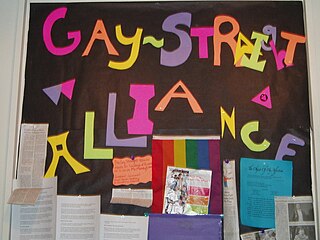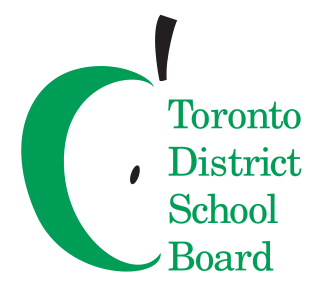
A school uniform is a uniform worn by students primarily for a school or otherwise educational institution. They are common in primary and secondary schools in various countries.
A zero-tolerance policy is one which imposes a punishment for every infraction of a stated rule. Zero-tolerance policies forbid people in positions of authority from exercising discretion or changing punishments to fit the circumstances subjectively; they are required to impose a pre-determined punishment regardless of individual culpability, extenuating circumstances, or history. This pre-determined punishment, whether mild or severe, is always meted out.

School discipline relates to the actions taken by a teacher or the school organization towards a student when the student's behavior disrupts the ongoing educational activity or breaks a rule created by the school. Discipline can guide the children's behaviour or set limits to help them learn to take better care of themselves, other people and the world around them.

A Gay–Straight Alliance,Gender-Sexuality Alliance (GSA) or even Queer–Straight Alliance (QSA) is a student-led or community-based organization, found in middle schools and high schools as well as colleges and universities, primarily in the United States and Canada, that is intended to provide a safe and supportive environment for lesbian, gay, bisexual, and transgender (LGBT) children, teenagers, and youth as well as their cisgender heterosexual allies. In middle schools and high schools, GSAs are overseen by a responsible teacher. The first GSAs were established in the 1980s.
Transgender rights in Canada, including procedures for changing registered gender and protections from discrimination, vary among provinces and territories. The federal protections from discrimination include sexual orientation since 1996 and gender identity and expression since 2017. As of May 2020, there is no Canadian federal ban on conversion therapy. Since June 2019, the Canadian passport offers an "X" option for gender identity.
Terence Hart Young is a politician in Ontario, Canada. He was a Conservative member of the House of Commons of Canada from 2008 to 2015 who represented the riding of Oakville. Previously, Young was a Progressive Conservative member of the Legislative Assembly of Ontario between 1995 and 1999.

The Toronto District School Board (TDSB), formerly known as English-language Public District School Board No. 12 prior to 1999, is the English-language public-secular school board for Toronto, Ontario, Canada. The minority public-secular francophone, public-separate anglophone, and public-separate francophone communities of Toronto also have their own publicly funded school boards and schools that operate in the same area, but which are independent of the TDSB. Its headquarters are in the district of North York.

The Ministry of Education (EDU) is the Government of Ontario ministry responsible for government policy, funding, curriculum planning and direction in all levels of public education, including elementary and secondary schools.

Freedom of religion in Canada is a constitutionally protected right, allowing believers the freedom to assemble and worship without limitation or interference.

In criminal justice systems a youth detention center, also known as a juvenile detention center (JDC), juvenile detention, juvenile hall, or more colloquially as juvie/juvy, is a prison for people under the age of majority, often termed juvenile delinquents, to which they have been sentenced and committed for a period of time, or detained on a short-term basis while awaiting trial or placement in a long-term care program. Juveniles go through a separate court system, the juvenile court, which sentences or commits juveniles to a certain program or facility.
Expulsion, or permanent exclusion, refers to the removal or banning of a student from a school system or university due to persistent violation of that institution's rules, or in extreme cases, for a single offense of marked severity. Laws and procedures regarding expulsion vary between countries and states.

Lesbian, gay, bisexual, and transgender (LGBT) rights in Canada are some of the most advanced in the Americas and in the world. Same-sex sexual activity has been lawful in Canada since June 27, 1969, when the Criminal Law Amendment Act came into force upon royal assent.
In Canada, appeals by the judiciary to community standards and the public interest are the ultimate determinants of which forms of expression may legally be published, broadcast, or otherwise publicly disseminated. Other public organisations with the authority to censor include some tribunals and courts under provincial human rights laws, and the Canadian Radio-television and Telecommunications Commission, along with self-policing associations of private corporations such as the Canadian Association of Broadcasters and the Canadian Broadcast Standards Council.
A zero-tolerance policy in schools is a strict enforcement of regulations and bans against behaviors or the possession of items deemed undesirable by said schools. Public criticism against such policies has arisen due to the sometimes negative consequences of its enforcement when acts deemed intolerable are done in ignorance, by accident, or under extenuating circumstances. In schools, common zero-tolerance policies concern possession or use of illicit drugs or weapons. Students, and sometimes staff, parents, and other visitors, who possess a banned item for any reason are always to be punished.
The New York Civil Liberties Union (NYCLU) is a civil rights organization in the United States. Founded in November 1951 as the New York affiliate of the American Civil Liberties Union, it is a not-for-profit, nonpartisan organization with nearly 50,000 members across New York State.

The Food Quality Protection Act (FQPA), or H.R.1627, was passed unanimously by Congress in 1996 and was signed into law by President Bill Clinton on August 3, 1996. The FQPA standardized the way the Environmental Protection Agency (EPA) would manage the use of pesticides and amended the Federal Insecticide, Fungicide, and Rodenticide Act and the Federal Food Drug and Cosmetic Act. It mandated a health-based standard for pesticides used in foods, provided special protections for babies and infants, streamlined the approval of safe pesticides, established incentives for the creation of safer pesticides, and required that pesticide registrations remain current.
Education in Ontario comprises public and private primary and secondary schools and post-secondary institutions.
Anti-bullying legislation is a legislation enacted to help reduce and eliminate bullying. This legislation may be national or sub-national and is commonly aimed at ending bullying in schools or workplaces.

In the United States, the school-to-prison pipeline (SPP), also known as the school-to-prison link or the schoolhouse-to-jailhouse track, is the disproportionate tendency of minors and young adults from disadvantaged backgrounds to become incarcerated, because of increasingly harsh school and municipal policies. Many experts have credited factors such as school disturbance laws, zero tolerance policies and practices, and an increase in police in schools in creating the pipeline. This has become a hot topic of debate in discussions surrounding educational disciplinary policies as media coverage of youth violence and mass incarceration has grown during the early 21st century.

In Canada, carding, which is officially known as the Community Contacts Policy, is an intelligence gathering policy involving the stopping, questioning, and documenting of individuals when no particular offence is being investigated. The interactions take place in public, private or any place police have contact with the public. The information collected is kept on record in the Field Information Report (FIR) database. Field Information Reports include details including the individuals' gender, race, the reason for the interaction, location, and the names of any associates, to build a database for unspecified future use. Officially, individuals are not legally detained, but this distinction is not clear.










